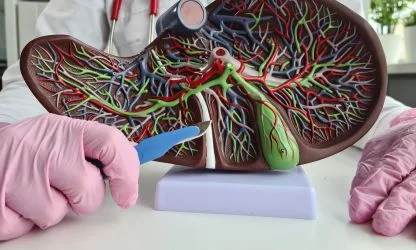Gallbladder Problems During Pregnancy: What You Need to Know
Pregnancy is a transformative period in a woman's life, bringing about numerous physiological changes. While many are familiar with common pregnancy-related conditions, gallbladder problems during pregnancy often go unnoticed until they manifest as significant discomfort or complications. Understanding these issues is crucial for expectant mothers to ensure timely intervention and maintain overall health.
Thursday, 20 March, 2025

Understanding the Gallbladder's Role
The gallbladder is a small, pear-shaped organ located beneath the liver. Its primary function is to store and concentrate bile, a digestive fluid produced by the liver, which aids in the digestion of fats. During digestion, the gallbladder releases bile into the small intestine, facilitating the breakdown and absorption of dietary fats.
Gallbladder Challenges During Pregnancy
Pregnancy induces hormonal fluctuations, particularly elevated levels of estrogen and progesterone, which can influence gallbladder function:
-
Slowed Gallbladder Motility:Progesterone relaxes smooth muscles, potentially leading to reduced gallbladder contractions. This relaxation can cause bile stasis, increasing the risk of gallstone formation.
-
Increased Cholesterol Saturation: Elevated estrogen levels can enhance cholesterol secretion into bile, making it more cholesterol-rich and prone to stone formation.
Common Gallbladder Issues in Pregnant Women
-
Gallstones (Cholelithiasis): Solid particles that form from bile components. While many gallstones are asymptomatic, they can obstruct bile flow, leading to pain and other complications.
-
Biliary Sludge: A precursor to gallstones, biliary sludge consists of microscopic particles that accumulate in the gallbladder. It can be asymptomatic or cause symptoms similar to gallstones.
-
Cholecystitis:Inflammation of the gallbladder, often resulting from gallstones blocking the cystic duct. This condition requires prompt medical attention.
Recognizing Symptoms
Gallbladder problems during pregnancy can present with various symptoms:
-
Abdominal Pain: Persistent pain in the upper right or middle part of the abdomen, which may radiate to the back or right shoulder.
-
Nausea and Vomiting: Often accompanying abdominal pain, these symptoms can be mistaken for typical pregnancy-related morning sickness.
-
Jaundice: Yellowing of the skin and eyes, indicating a possible bile duct obstruction.
-
Fever:May suggest an infection or inflammation of the gallbladder.
If these symptoms persist or worsen, it's essential to consult a healthcare provider promptly.
Risk Factors
Several factors can elevate the risk of gallbladder problems during pregnancy:
-
Obesity: Excess body weight can increase cholesterol levels in bile, promoting gallstone formation.
-
Rapid Weight Loss: Sudden weight loss can disrupt bile chemistry, leading to stone formation.
-
Family History: A genetic predisposition can play a role in gallstone development.
-
Diet: High-fat, low-fiber diets can contribute to gallstone risk.
Diagnostic Approaches
When gallbladder issues are suspected during pregnancy, healthcare providers may employ:
-
Ultrasound Imaging: A non-invasive method to detect gallstones or biliary sludge.
-
Blood Tests: To assess liver function and check for signs of infection or inflammation.
Treatment Options
Management strategies depend on the severity and nature of the gallbladder problem:
-
Conservative Management: For mild symptoms, dietary modifications (low-fat diet) and observation may suffice.
-
Medications: Analgesics for pain relief and antibiotics if an infection is present.
-
Surgical Intervention: In cases of recurrent or severe symptoms, a cholecystectomy (gallbladder removal) may be necessary. Laparoscopic cholecystectomy is generally safe during pregnancy, preferably during the second trimester.
Preventive Measures
To minimize the risk of gallbladder problems during pregnancy:
-
Maintain a Healthy Weight: Aim for a balanced weight before conception.
-
Adopt a Balanced Diet: Emphasize high-fiber foods, fruits, vegetables, and whole grains while limiting high-fat and fried foods.
-
Regular Physical Activity: Engage in appropriate exercise routines to promote overall health.
Conclusion
While gallbladder problems during pregnancy can pose challenges, understanding the symptoms, risk factors, and treatment options empowers expectant mothers to seek timely care. Collaborating closely with healthcare providers ensures both maternal and fetal well-being throughout the pregnancy journey.